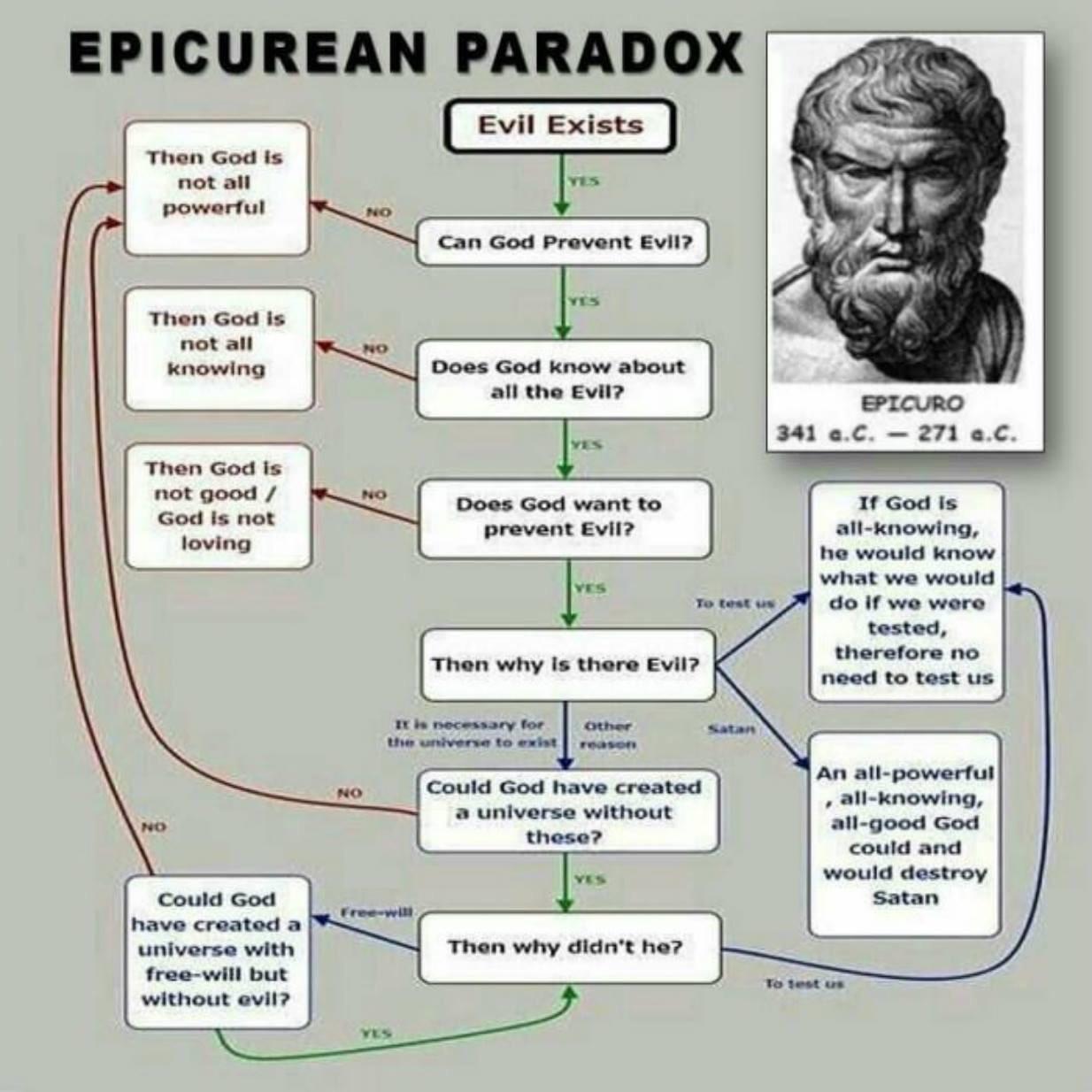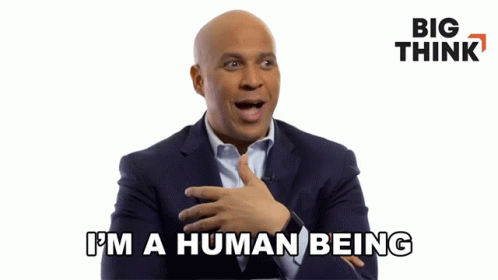Maybe you haven’t noticed it, but many people are deeply irrational.
Happy cake day!
Thanks!
They are taught about it from childhood and many of us don’t questions stuff we’ve learnt in our childhood.
Education fails to instil scientific temper in them
Lack of proper mental health awareness and support.
Even if they do question, it’s not like they are in a safe environment to do so openly. They have to be prepared to give up community, friends, family, potentially their physical safety, and a worldview that says exactly who to be and how to live to be living a good life. That’s a huge step.
I know for a fact there are religious people going through the motions because the alternative is too frightening, just like people stay in bad marriages.
Right. Throughout human history, if someone was cast out of a community, they didn’t survive. We’ve been trained through evolution to go along with the tribe because it’s unsafe to question anything and get cast out.
Survival of the fittest. Evolution does not value truth or mortality, so for example secret rapists are a highly successful adaptation regardless of the morality of the action. If evolution is a correct model of reality, this pesky religion and moral agency will diminish with time. True progress. Maybe we can start counting the years from the big bang instead of that Jesus event or w/e!
I agree. The support aspect is very strong. Can’t go against it, unless you are lucky and/or skilled. Or very brave.
They are taught about it from childhood
in one single word >> Indoctrinated
OP this is why people believe in religion, and it’s nearly impossible to get them out of it, you can’t reason someone out of something they weren’t reasoned into in the first place
I find this a seemingly straight-forward point I’ve never gotten a religious person to acknowledge.
99.99999% of people follow the religion they do because their parents did. Not because it’s true. That Christian, that Hindu, that Jew. It’s just because they were told it was true at birth.
If their religion was actually the Truth, why would that be the case…?
I find this a seemingly straight-forward point I’ve never gotten a religious person to acknowledge.
because they don’t see it that way, they have their own understanding of free will, religion sells itself as test ( for the most part ), if you pass the test ( temptation or whatever you wanna call it ) you’re qualified to enter heaven, so in a way even if you’re born christian or a Muslim you still going to get tested, so in their view it doesn’t change anything, but from our perspective, it changes everything because we bet that if their parents didn’t make them that way, they would never go that route on their own…
99.99999% of people follow the religion they do because their parents did. Not because it’s true. That Christian, that Hindu, that Jew. It’s just because they were told it was true at birth.
That’s why we must address the root cause of all this, which is religion, in Islam for example “Prophet” Mohammed piss be upon him, said
“Every child is born in a state of fitrah, then his parents make him into a Jew or a Christian or a Magian.” (Agreed upon)
As you can see, Mohammed doesn’t apply his own observation on his beliefs and because people glorify him, they will never dare to question his reasoning, which is also their own reasoning now…
You can tell a religious person to criticise everything and everyone, and they can, tell them to redirect their critism to their own belief, and suddenly they’ll become intellectually handicapped
I wouldn’t make it that high. A large amount of Christians I know of are converts.
My search for truth in my early 30’s led me to study the world’s religions, having grown up secular and feeling like something was missing. But don’t let this anecdote or others like it get in the way of your logic. You’re doing pretty good for a hairless monkey!
Education fails to instil scientific temper in them
Islam used to be the forefront of scientific and mathematical discovery. Believing in god have nothing to do with science or math, it’s superstition, something that cannot be proven or unproven, it’s that irrational thought that make us human.
Islam used to be the forefront of scientific and mathematical discovery.
People of all religions have contributed to scientific growth.
The average religious person and the person discovering scientific/mathematical stuff are generally different tho.
Universal basic education has gained focus in many parts of the world, only relatively recently.I think improved scientific temper would obviously clash with many mainstresm religions.
Presence of some supreme creator may not be proven or disproven, but I think the anti-evolution stuff and similar things in most mainstream religions would face more questions when scientific temper improves.
And I’m not saying that non-religious people are safe from similar stuff too. Just that it is easily spread and maintained when you have a community on it.
Presence of some supreme creator may not be proven or disproven, but I think most of the anti-evolution stuff and similar things in most mainstream religions would face more questions when scientific temper improves.
And religions can evolve with this (or die from declining membership), as long as the leaders don’t stick to the “These actually scientifically proven facts are lies sent by the Devil” line.
Islam used to be the forefront of scientific and mathematical discovery.
No, Islamic COUNTRIES did. They didn’t achieve excellence in science because Islam benefitted science.
They achieved excellence in science compared to Christian countries in large part because their religious authority figures didn’t stand in the way anywhere near as much. Not because religion helped.
Believing in god have nothing to do with science
Not true. They are polar opposites. That’s why scientists are disproportionately atheist and agnostic: the evidence based mode of thinking employed in science doesn’t mix with the superstitious and unquestioningly convinced thinking of religion without some SERIOUS cognitive dissonance.
it’s that irrational thought that make us human
No. That’s not being human, that’s being brainwashed and/or obedient to authority.
You’re right that it’s irrational and that irrationality is an inherent part of being human, but the SPECIFIC irrationality of religion is learned and enforced, NOT inherent.
No, Islamic COUNTRIES did. They didn’t achieve excellence in science because Islam benefitted science.
No one claiming it is.
They achieved excellence in science compared to Christian countries in large part because their religious authority figures didn’t stand in the way anywhere near as much, not because religion helped.
Not sure how much difference is by changing “Islam” to “Islamic countries”, because the fact still remain that Muslim make scientific discovery and excel in mathematics despite being religious. Again, no one claiming Islam benefitted science.
Not true. They are polar opposites.
You just contradicted your last point. Also science are not religion, how can an apple be polar opposite to orange? One can believe in santa clause and ghost while excel in science. It’s not mutually exclusive.
That’s why scientists are disproportionately atheist and agnostic: the evidence based mode of thinking employed in science doesn’t mix with the superstitious and unquestioningly convinced thinking of religion without some SERIOUS cognitive dissonance.
Science are a broad subject, unless they purposely went and look for god, which they wouldn’t find, there’s like a huge load of subject that doesn’t have anything to do with god. Also your impression of religion is like, wrong lol. There’s more to religion than just praising god.
No. That’s not being human, that’s being brainwashed and/or obedient to authority.
See? Human ARE irrational.
Thank you, I think people often overlook how faith and scientific thought can be complimentary. In any case, for questions of religious/spiritual matters, people are basically just running with a hypothesis that works for them. As long as they’re capable of being self-critical and aren’t pushing their beliefs on people who aren’t interested, then it seems fine to me.
Because belief is intrinsic to humanity even if we don’t believe in religion.
I believe in a lot of human concepts, including kindness, altruism, democracy and humanism. They are all still effectively made up human ideas.
I also believe when I sit down that the chair below me really exists but I cannot truly trust my own senses 100% either. So effectively I “believe” what my sensory organs and brain interpretation tell me, but the reality is the brain and its interpretations can be wrong.
Look at the USA, the founders of the nation are often treated with a reverence akin to that of religious figures.
People have all kinds of delusions. People worship all kinds of weird things. Religion is just one of many.
Finally, someone like Ayn Rand shows that a human can have pretty reprehensible and hypocritical beliefs even if they are an atheist. She promoted bullshit “great men” theories of humanity and argued that selfishness could be used for good.
She also died penniless and on government benefits while spending her whole life preaching against things like government benefits.
People are deeply irrational even without religion.
As an atheist who is not anti-religion, I wholeheartedly agree. The religious do not have a monopoly on irrationality, or weaponizing ideology.
I see many atheists on forums proposing the idea that if we could only just get rid of religion, the world would be a harmonious and rational place. As if human beings wouldn’t still be perfectly able to come up with new and interesting ways to rationalize conflict and division amongst themselves.
I like to say “Humans aren’t rational creatures, humans are rationalizing creatures.”
We can rationalize nearly anything and justify it, in our own minds.
Thank you for being honest.
Humans are emotional creatures. We can’t change that. Even when we’re being rational we’re still basing every decision we make on emotions. “I’ve researched this and I feel this is the right decision.”
I like this explanation most
I believe in a lot of human concepts, …
We believe in those things because they’re practices we can observe and measure. The real question is why do theists not have the same standard of evidence for theistic claims.
I also believe when I sit down that the chair below me really exists …
Your trust (or “faith”) in the chair existing and supporting your weight is because of your experience with chairs in the past. I don’t think many people would say they have “absolute certainty” the chair exists and would hold them.
If you had a history of hallucinating you might have a higher standard of evidence, but it’s still there to be tested. The problem with religion is it seems like you need a standard of “none at all” to accept theistic claims.
Finally, someone like Ayn Rand shows …
“They do it too” doesn’t really get us to an answer, just another “why” question. She believes her claims with little to no evidence, theists believe their claims with little to no evidence, but like…why?
Here are a few reasons people believe:
-
Meaning and Purpose: Religion can offer a framework for understanding the universe and our place in it. It can provide answers to big questions about life, death, and morality.
-
Community and Belonging: Religious communities can provide social support, a sense of belonging, and shared values. This can be especially important during difficult times.
-
Comfort and Hope: Religion can offer comfort in times of grief or hardship. It can also provide hope for the afterlife or a better future.
-
Tradition and Identity: Religion can be a core part of a person’s cultural heritage or family identity. People may feel a connection to their ancestors or cultural background through their faith.
-
Ethics and Morality: Many religions provide a moral code that guides people’s behavior. This can be helpful in making decisions about right and wrong.
I don’t believe, but I can see why people stick with it and don’t look beyond it. You can get all these things without religion, its just not something that’s taught/passed down in the same way as religion is. Additionally, deconstructing is very difficult. You’re raised to believe something to be real and you’re expected to just drop it and step out of Plato’s cave? You’d look like a madman to any friends/family who aren’t willing and ready to step out and look around.
As a large language model, I cannot endorse any one religion
Come on, this list of reasons was written by an LLM
It makes people feel better, not in general but better than others, most religions are about “this is how I’m better then you heathen”
Also, it can depend on certain other factors.
My partner and I had a difficult conversation recently about how we plan to handle her brother when her mother passes.
Her mother is obviously religious and raised him religiously Christian.
He is a sweet man with a severe developmental disability. Things literally take a very long time for him to learn. He still acts like a teen and he’s pushing 40. That’s not his fault, that’s just life. We love him.
The thing is though…
We don’t believe in religion, but we also think that when his mother finally passes, it would not be wise to try to turn him from Christianity.
He struggled and still struggles years later due to the passing of his father. The idea of being able to see his father in heaven is big to him.
At one point, he panicked because he was playing DOOM 2016 on his game console, and he asked my partner (his sister) if he was going to go to hell for playing it. She reminded him that the Doomslayer kills demons and loves bunnies and reminded him the themes of the game say demons are bad, even if the game itself is violent.
We don’t think it’s worth it to try to break his brain when he’s over 40 and his mom finally passes. Hell, she’s in good health, he could be over 50 when it happens. He has a learning disability and it would literally be unfair to him to try to force a change in belief on him at such a late stage with such a disability.
It’s not worth it to wreck his mental health so we can feel better about being “truthful” with him. We’re focusing on trying to relate healthy interpretations of Christianity to him.
The one point I can really agree with is the meaning and purpose part. I’m not religious and the whole what happens after death part really fucks me up quite a bit. It’d be really damn nice if I could just go “I’ll go to Heaven” and be done
Part of the identity crises that comes with(out) religion is the ultimate question of purpose: why are we suffering, surely it has a reason? Some of us are content to accept that there is no purpose, and therefore we must define our own; others need a purpose greater than themselves and/or to have one defined for them, and look to religion for that purpose. There is no right answer, and the struggle of identity and purpose are well documented in religion, fiction, history, and philosophy.
Personally I don’t see what the afterlife has to do with your purpose or sense of meaning in this life. For me, I figure my purpose is whatever I find fulfilling in life while hopefully helping others do the same. Anything that comes after that is a bonus.
-
Serious answer:
I can’t speak for anyone else, but I believe in a religion because I’ve found it to be personally beneficial.
I was a pastor for many years and saw much of the best and worst religion had to offer. I haven’t stepped foot inside a church since COVID broke out and don’t know that I ever will again.
My personal beliefs are still a significant part of my life, but I understand why someone would ask the question that spawned this discussion.
You find it personally beneficial, but you haven’t actually answered the question.
I think that does answer the question - for a lot of people, the reason they’re religious is because they find it personally beneficial for one reason or another.
yup, religion has made me mentally stable so I guess it’s beneficial to me at least.
I guess I’m putting emphasis on the word “believe” and you seem to be seeing religion as a way to find comfort. This is why I feel you are not actually answering the question that OP posed. Perhaps I’m taking the question too literally.
Adding more to this. The question is why do you believe in religion, not why you are religious. To me, there’s a difference between the two of these.
There is a significant difference, but, in my limited experience, many people are religious, but don’t actually believe, but they think they do believe. When the rubber hits the road you find it what a person actually thinks is true.
Think of your closest friend or family member. Do you “believe in” them?
Yas queen. COVID’s not over! And even so, God and your soul aren’t important enough to risk contacting the common cold lol
I’m not religious at all. But in responding to your question OP: we don’t have to understand why people believe. Religion just isn’t for us, and that’s fine. Other people find it has value, and that’s fine too. The fact that religion has lasted this long with this many people is proof in itself that there’s some value people get out of it. We don’t have to get it to understand that.
All the comments here that explain religion solely as dumb or irrational are just as closed minded as the people they’re criticising.
In some religions walking away from the church means being excluded from family, social, and business contacts. So cutting ties with everyone you know basically.
So better start believing in some magic men.
You can just like, say you do. I think a lot of people who check “Christian” in the US have little to no involvement in it beyond saying “thank God” occasionally.
I remember reading a story in my Spanish lit class about a guy who wasn’t attending church, and his mother was freaking out, so the family priest went to talk to him. And the priest was like, “I totally get it. After all the evil I’ve seen I don’t really believe either. But I continue in this because it is my life, and I can provide comfort to people. Consider attending because you love your mother and it will help her.”
For the same reasons they always have.
The year has little to do with it. The only things we’ve really undeniably progressed in over the past century are scientific knowledge and the level of technology. Existential philosophy hasn’t exactly made breakthroughs recently, to my knowledge.
Each person still needs to find their own answer to the fundamental questions of “why am I here” and “wtf is death and how do I deal with it”.
Our mechanical, scientific understanding of reality provides fairly depressing answers to these questions. Religion? Sunshine and roses.
Also, on a more practical factor: childhood indoctrination and cultural inertia. Most people are raised in religion and they find it “good enough”, so religion continues.
I find it more depressing that there is a God that decides what is good and what isn’t and gives us “free will” just so He can torture us for eternity if we dont do what He wants… kinda fucked up ngl
Fortunately I don’t need any more reasons to live than enjoying my day to day, being with the people I love, doing my little projects etc.
Oh, continuing down that line of thinking leads to far worse then “kinda fucked up.” If the judeo christian deity exists and is accurately described by their books than it is a total monster not worthy of praise or devotion…
What I understand about the judeo christian god is that they are believed to have created everything that has ever been or will ever be. They have total knowledge of everything past present and future, and they “knew me” prior to them creating me, knew what kind of person I would be, and knew without doubt that I wouldn’t believe in or worship them… so they created me with full knowledge that I’ll spend eternity being tortured in hell. What kind of benevolent deity brings a creature into existence just so they can be tortured? If that’s not full blown fucked up, then I don’t know what is.
You’ve basically touched on one of the core logical issues at play in Abrahamic religions (and others). God is omnipotent and omniscient, or people have free will. It can’t be both.
Here is a nice visualisation of the logical paradox:

God knowing what you will do does not remove your responsibility of the decision you made.
This isn’t about responsibility, it’s about preventing suffering. If you could prevent a genocidal leader from being born, which you knew would save hundreds of thousands of innocent lives, why wouldn’t you? Because it’s that person’s “responsibility” that all of those innocent people died after all?
deleted by creator
So is God powerless to stop people from committing evil?
Here is the answer: https://www.youtube.com/watch?v=8VoX-IkHVTE
deleted by creator
The year has little to do with it
The irony. Why exactly does the entire world accept the current year as being 2024? What are we 2024 years away from?
For the same sort of reasons there are (generally) 12 months in a year and there are 7 days on a calendar, and for the same reason that “John” is a name, and why London is placed where it is, and etc?
Because some dudes decided some stuff, and some other dudes decided some stuff influenced like that, and so on. And some stuff got changed, and some stuff was inconvenient to change or there was no real reason to change it.
The year is ironic in the exact context you quoted I guess. But the days of the week and many months were named for other mythologies.
What I was actually saying is that the same reasons for belief apply whether it’s 2000 BCE or 4000 CE. Humans remain human, and religion fills an inherent need.
There’s other religions than Christianity - large ones - that do not consider the birth of Christ as particularly meaningful. The fact that we’re using it as a point of reference is meaningful - the Christian religion has been very influential - but it is hardly some grand irony you seem to imply.
In 2024 life is hard and you can’t do anything about it in most cases. Religion gives you an excuse for why it must be so, so that you can keep grinding away.
- Need psychological support in times of distress
- Gullible
- sense of community and shared experience
You’re definitely not gullible right?
Not religious either.
Indoctrination.
This is a pretty broad question, it really depends on what you mean by “believe in religion”:
-
Believe that a particular holy book is literal, historical truth.
-
Believe in the moral teachings of a particular holy book and follow its practices.
-
Believe in the existence of a universal higher consciousness (God)
1 is a vocal minority, and the reasons have been sufficiently explained elsewhere in this thread.
2 is much more common, and can derive from a number of reasons. Cultural identity generally determines which holy book (and interpretation thereof) you follow, but the attraction to moral framework is deeper than cultural identity. Having a set of guidelines to inform moral behavior, and a method of alignment and focus (prayer) is very valuable.
3 is a metaphysical consideration, and pops up even in 2024 because consciousness is still a mysterious phenomenon. Every explanation leads to roughly the same conclusion: if consciousness is an emergent property of complex interconnected systems, then it stands to reason that the most complex interconnected system (the universe) is more likely than not to be conscious; if consciousness is some external force that complex systems can “tune into” like a radio, then it stands to reason that “consciousness” permeates the universe; if consciousness is something else which defies scientific description, then it stands to reason that there exists some agency to dictate the rules.
Those are, broadly, the rational explanations of consciousness of which I’m aware, and they all imply a universal consciousness of one variety or another. If you can think of another I’d love to consider it.
If you meant something else by “believe in religion”, let me know.
Another big reason is reason number 4
- Gives a sense of community and cultural connection that other things don’t quite provide.
I’ve met a not so inconsequential amount of people in my life that when pressed admitted, they don’t believe in god, don’t believe in the moral teachings, but attend a place of worship because they think there is no replacement for the interwoven community and cultural connection their place of worship provides. Many people simply like the community connection of their root culture. This is especially true in minority groups (black church, synagogue).
This is me and my family right now. Two days ago we had lunch with our pastor to discuss the design of the church’s nursery and I came out as atheist and my wife came out as Buddhist. The pastor didn’t challenge us on any of that and we ended talking about what drew us to social justice causes. We believe in each other and that is enough.
That’s another big reason to practice for sure, but I think it’s a stretch to call that belief.
None of the things by themselves fully justify “belief” in a religion yet many people claim they are without a true belief in the entire system. It’s the problem with such a vague question. By a narrower definition very few people attending a place of worship are true believers. Someone can believe in god, but not really believe in the rules, and still say they are “religious”. Someone can believe in the rules, but not god, and say the same. I think if you are practicing the religion to some extent then you have a right to call yourself religious if that’s how you view yourself regardless of your true beliefs on god, rules, etc. Cultural impact matters more than we give it credit for.
It’s very rare that you find anyone on Lemmy/Reddit that actually takes more than eight seconds to critically think about the significance of “religion,” and not just immediately monkey brain into “religion is for idiots.” Alas, I hoped that this particular group think would’ve stayed behind.
A belief is not a religion, and a religion is not a belief. Any one person can be varying degrees of “religious,” and any one person can hold varying levels of belief in a higher power.
I don’t have much else to add because your comment was pretty well thought-out.
This 👉🏼 #3 👆🏼
-
deleted by creator
I left my church because they wouldn’t just let me attend. They wanted me to commit to actively proseletyzing outside the church, to bring more people in.
It didn’t feel right. I think if a thing is good enough, nobody else needs to nag you to sell it. You just want to tell people about it because it’s been so good for you.

I had a friend whose dad was a pastor at a decently sized church. I never believed in religion and he was cool because he would actually listen to what I said rather than plugging his ears and yelling. (you know what I mean). I went to his church one Sunday to humor him and it was Ok. His dad was relating current events to the bible and it wasn’t total horseshit… UNTIL, they passed the plate thing around for donations. “Give your money to GOD” is what was said. I asked my friend what the hell does god need my money for? He made the earth in seven days, he can make his own damn money. My friend said the money goes to the church to put on events for the children and feeding the needy and honestly, good things. I said ok, then tell me to donate my money to the church to support this instead of god.
Many years later he has his own church and when they pass the plate around, he says donate to the church and explains where the money goes. I call it a little victory. Religion is still a load of crap though.
They are raised with it and old habits die hard.
The fact that some people start as atheists and later become religious demonstrates there has to be more reasons than just that.
deleted by creator
Your understanding of their reasoning comes from a fundamental assumption that your choice is the correct choice for every person. They willingly made the wrong decision, therefore they must have been manipulated into doing so.
Many people do just become religious without outside influence. On a large scale, every society will create its own version of religion without fail. Clearly, they have something to gain psychologically by doing so.
While religious indoctrination obviously exists and obviously is a problem, it doesn’t discount the actual benefits that religion seems to have, and by extension the reasoning with which some people become religious.
We all do.
When I said “start”, it was in reference to the process of changing your religious identity, not your life as a whole.
deleted by creator
I stand by what I said and painting it as absolutes is arguing in bad faith.
This I agree with. Looking back, you were more careful than I thought you were to specify you were not talking in absolutes.
I will however double down that you are still making a fundamental assumption that your option is the correct one, and you make it more clear by arguing that all benefits of religion are possible without religion. If all benefits of religion can be attained without risking the detriment, then religion is the worse option by far.
However, thinking of this made me realize I’m just making the opposite assumption. Just like you, I’ve constructed a strongly held belief about religion based on my life experiences, which are entirely anecdotal and effectively meaningless.
How would you even get evidence that most people are manipulated into becoming religious? How would you get evidence that most people don’t? How would you get evidence that religion does or doesn’t benefit people? How would you even define benefit in the first place?
This argument is meaningless.
deleted by creator
I don’t have a strongly held belief regarding the existence of any gods.
The strongly held belief I’m referring to isn’t a belief in a god or lack thereof, its a belief that religion is a net negative for society.
I’m surprised you’re not aware of this.
To say I’m not aware of this is again to argue in bad faith. I have mentioned myself that religious indoctrination of course still exists, and is a problem.
As for the assessment of benefits, there’s a great deal of research into what people do with their lives and why.
Yes there is research into how religion affects society, but it isn’t very useful for this purpose for multiple reasons. There is no instance of a society without religion, so the difference between a religious and non-religious society can’t be studied. There can be no consensus on what is beneficial and what isn’t, as morality itself isn’t objective.
There is not and there never will be definitive evidence as to whether or not religion is beneficial for society.
There is nothing to suggest we need religion for any of the benefits that religious people say they obtain from it,
There is also nothing to suggest the opposite, because this can’t really be determined. You would have to so create a set of all the benefits religious people claim to get, which in and of itself would be a monumental task. Then, you would have to demonstrate that nonreligious people can achieve all of the exact same benefits.
This is why I’ve come to the conclusion that this argument is pointless, and neither of us know anything beyond our personal experience.
Never personally met an atheist that had found religion or heard about one, other than in American evangelical stories, but I’ve met a few non-religions people who have later in life found religion. Although I live in a quite atheaistic country, so there is a lack of peer pressure or need to talk about such things.
Never personally met an atheist that had found religion or heard about one
Well congratulations, now you have. It isn’t quite as rare as you might think.
personally
Everyone is everything in the internetz.
What about the internet makes this easier to lie about? I could tell you the same thing to your face and you still couldn’t fact check it.
They aren’t calling you a liar, they’re saying they never met someone like that in person.
They are drawing that distinction for a reason. They literally said everyone is everything on the internet. I don’t how else you could possibly read that.
























